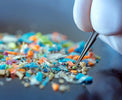
The Hidden Dangers of Everyday Items
, by Planet Green, 3 min reading time

, by Planet Green, 3 min reading time
In an effort to protect the environment and our health, we frequently encounter hidden dangers lurking in everyday products. Microplastics, tiny plastic particles that easily enter natural ecosystems and the human body, are a pervasive threat. From the ink cartridges that pile up in landfills to everyday items we encounter, for instance, melamine sponges in our kitchens, the spread of microplastics is a critical environmental issue.
Ink Cartridges and Microplastics
Ink cartridges, essential in homes and offices around the world, pose a significant environmental threat when they break down. It’s estimated that one-million ink cartridges enter landfills in the US on a daily basis, partially because people simply aren’t aware that they can send them in free to Planet Green Recycle for recycling. This simply action reduces the environmental threat and costs consumers nothing.
As the plastic components of used printer ink cartridges degrade, they release microplastics into the environment. These tiny particles can end up in our water systems, contributing to the broader issue of oceanic and freshwater pollution. This pollution has a cascading effect on wildlife and human health, contaminating the food chain with particles that are difficult to extract and eliminate.

Common Household Hazards
A recent study highlighted in the Environmental Science & Technology journal brings attention to another everyday product that produces the same effect, and gets tossed into the trash as regularly as printer ink cartridges. Melamine sponges, commonly referred to as "magic" sponges, are celebrated for their cleaning efficiency but come with that same often undiscussed cost to the environment.
Researchers from Nanjing University discovered that these sponges shed about 6.5 million microplastic fibers per gram of sponge material worn away during use. This results in an estimated release of 1.55 trillion microplastic fibers into the environment each month from these sponges alone, based on sales data and typical usage patterns.
Broader Impacts of Microplastics
The concern extends beyond just these fibers. Microplastics often carry harmful chemicals that can disrupt hormonal functions, potentially leading to reproductive disorders and certain types of cancer. Additionally, these particles can attract and bind with toxic substances like heavy metals, further increasing their danger when ingested by wildlife or humans.
Mitigating the Threat
To tackle the microplastic issue, both manufacturers and consumers have roles to play. For ink cartridges, participating in recycling programs like those offered by Planet Green Recycle can significantly reduce the number of cartridges that end up in landfills, thereby limiting microplastic pollution. Manufacturers are encouraged to design products that are easier to recycle and that degrade more safely.
Regarding melamine sponges, researchers suggest that creating denser, more durable sponges could reduce the release of microplastics. Consumers, on the other hand, might consider switching to natural alternatives that do not contribute to microplastic pollution as well as investing their printing budget into recycled or US remanufactured ink cartridges to help slow the spread of toxins due to waste.
Take Action
As consumers, we can make informed choices to minimize our environmental footprint. Opting for products that are environmentally friendly and supporting recycling initiatives are vital steps toward a cleaner, healthier planet. Join us at Planet Green Recycle in our mission to reduce waste and protect our natural world by recycling your ink cartridges and choosing sustainable remanufactured and recycled ink and toner products, made in the USA.

Pinellas County, Florida, has taken a significant step in combating plastic waste by adding Planet Green Recycle to its public-facing information website. Residents and businesses...

The Holiday Spirit Meets Sustainability The holiday season is a time for giving, celebrating, and creating memories. It’s also a time when we tend to...

With November 15th being celebrated as America Recycles Day, the Plastics Industry Association (PLASTICS) commemorates Recycling Week this year from November 11th through November 15th...

Plastic pollution has become one of the most pressing environmental issues of our time, impacting land, waterways, and marine life on a global scale. While...